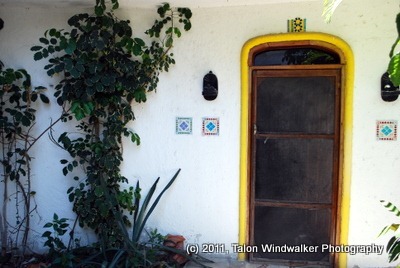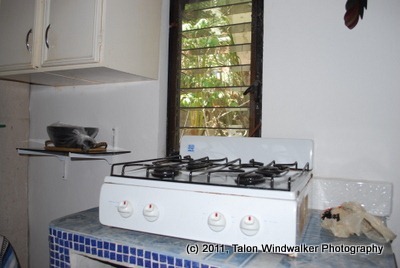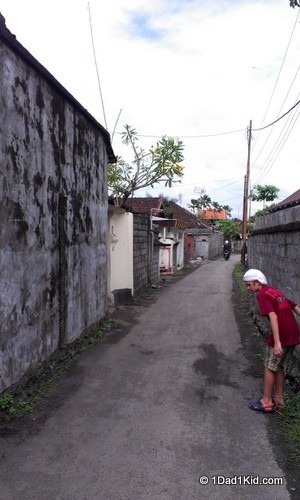Many long-term travelers like to brag about how they live like a local when they travel. They eschew staying in hotels and tourist areas and prefer to live in neighborhoods full of locals. Our style is very much like that; however, none of us is really living like a local when we travel.
There are some travelers who live on very meager budgets and stay in extremely humble conditions sometimes located in rural villages.
They still aren’t living like a local.
I don’t bring this up as a dig on anyone’s travel style. We all have different styles, and that’s fine. But I feel that when I remember the nuances of how I live, it helps me to see things from a completely different perspective.
No matter how humble the conditions are, I have a few things on my side that a local may not.
- If I don’t like an area, I can just up and leave. Too many bugs invading my bed, and I’m out of there. Propensity to flood? I’ll avoid it during the rainy season. Most locals don’t truly have that mobility. Regardless of income, most locals can’t just up and move. Some governments require a letter before a citizen can relocate. The expense may be too great. What do they do about all their family who may be living with them or nearby? Not once in my adult life have I ever been bound by these restrictions.
- Unless I’m somewhere like Europe, the US, or Australia, my purposely meager income is still far beyond most of the people around me. I may be living in a 1-bedroom apartment that regularly has small crabs walking through my living room (hello Utila!), but I’m not forced to live there by my circumstances. I don’t have to pay for my child to go to school. I’m not supporting other family members.
- I have more chances to increase my income if I choose. The Vietnamese hotel owner who is working sometimes 20 hours a day can’t easily do that. I keep my work hours to a minimum on purpose. If I want to earn more money, there are jobs or financial opportunities I can pick up.
- As a US citizen, I hold a passport that is powerful for travel. Most countries will gladly let me cross their border without asking me for a fee or giving me a second glance. My friend who is a Vietnam native couldn’t visit France. He had to apply for a visa, be interviewed, and submit all kinds of documentation to help allay fears he would simply stay put once there, in spite of the fact he was traveling with his partner and daughter who are both Australian. His visit was denied. For me to visit France, I just arrive, hand over my lovely dark blue passport, and walk through the door. Voila!
- I can theoretically say whatever I want about my government, but France just recently decriminalized insulting their president. In Thailand, if you disrespect the king you can and will be jailed. Bloggers in Vietnam and China are often arrested and heavily penalized, sometimes along with their families, for speaking out. I don’t live in fear of speaking out. Obviously, as a tourist I keep my mouth shut about the local government. I’m a guest in their country, and I’m not going to be rude to my host. But if I did speak out, most likely the worst that would happen is we would get escorted to an airplane.
- I’m generally not held to the same standards as a local. When I commit a social faux pas in Morocco by eating with the wrong hand, it’s no big deal. I’m a tourist. A local has to be much more concerned with the societal requirements of their culture. If I accidentally offend someone, I’ll be leaving soon. A local may never live it down.
- Because I’m not a citizen or resident, I can breeze through local life emotionally and mentally relatively unencumbered. I don’t have to be concerned about the latest crackdown, the latest tax, a new regulation, the local police constantly scamming me (although in some places that IS a problem for tourists). My life is much more carefree than most people’s. Granted that’s by choice, but not everyone in the world has the opportunity to make the same choice.
One downside is I will also most likely pay more than a local for many things. Unless I shop in a store with price tags on everything, I’m often going to be overcharged for items simply because I am perceived to have more money. No, it isn’t right, and sometimes it’s extremely irritating, but it happens, and it’s just the nature of things.
Although, I have also been in many places where I wasn’t overcharged.
Remembering just how deep my privilege runs helps me to be more patient with some idiosyncrasies when traveling. It also helps me see a local’s life through a different lens. I like to live more like a local than a tourist when we go to places, but I also don’t kid myself about just how different my life reality really is. And I’m thankful for it.
What helps keep you “humble”?









March 23, 2016
Having lived in India for 4 years, I definitely relate to this post. I might have lived “like a local” when it came to the food I ate, the flat I lived in, the clothes I wore, etc…. But to me there was one major difference : I did not have the moral constraints the locals did.
I remained a Western girl : although I dressed more conservatively than I would have normally, I did not feel any of the familial and cultural pressure that the girls my age were under.
As a western girl, I enjoyed all the freedom Asia has to offer. I was living a simple lifestyle, but nonetheless better, in my eyes, than the one I would have had in the West. I drove a bike without worrying about getting a license, ate my fill of fresh exotic fruits, could afford eating out, going out, travelling around the country. Things that had previously been completely out of reach as a broke student in France.
Obviously, being a white girl in India, I also experienced racism and sexism in a rather brutal way. One important thing to remember : the locals themselves would never consider me like a local, even though I was well integrated and spoke Hindi. I didn’t grow up there, I was white, my parents were not Indians. For any local, that was final.
Although, one of my Indian friends once told me ” I feel like you have become Indian!”. And I know it meant a lot to him!
March 24, 2016
Sounds like you’ve had some pretty incredible experiences. Thanks for sharing your perspective.
March 8, 2015
Great post. At a conference I attended last year, one of the keynote speakers, Robert Reid, made a great point: He said (and this is probably not an exact quote): “Don’t live like a local, live with locals”. I liked that, because it seems much more real than believing we are locals, when we are not. And it focuses on what’s important: interacting with locals.
March 9, 2015
I love that! Absolutely true. I was thinking about this today as we went to the state-owned hospital. I had to pay for our care, unlike a local, but we were ushered to the front of lines because we needed an interpreter. So even though we live in an all-local neighborhood, ride the same buses, eat at the same places, and go to the same doctors, we definitely aren’t “like” locals. Definitely living with and getting a taste of what local life is, but I still have advantages they don’t.
March 7, 2015
I agree, it’s a myth that you can ‘live like a local’ while traveling. The only way you can actually live like a local is if you…live there.
March 8, 2015
Even then, you aren’t truly “living like a local.” You can be living in places with locals and experience a big part of the local culture, but simply living somewhere isn’t really the same thing when you don’t have the same burdens, etc.
March 7, 2015
I would say ‘living like a local’ is the right term, because many aspects of daily life would be similar to that of a local. There’s a difference between ‘living like a local’ and ‘being a local’ where all aspects of life are the same. But the characteristics and privileges of locals vary and to differentiate means there is a point where a local won’t be seen as living like a local. Personally, I never use the term but I have integrated into a society where I live with locals, I contribute to the bills and chores and am involved regularly in temple and community events. I do live like a local but I will always look like and be treated as a tourist. Yup, the term’s overused. I use the word authentic a lot but for the right reasons.
March 8, 2015
I don’t care for the authentic label either. That will probably be a post here soon. LOL
March 6, 2015
When I’m traveling, I blend in with the crowd specially in Asia.. so I really have the chance to live like a local.. plus of course the budget constraints will sometimes force me to live like a local xD… but it keeps me humble ;D
March 8, 2015
Often the fact that you’re visiting from another country already removes you from “living like a local.” Just because we live in similar neighborhoods, eat at the same places, etc., our experience is still very different.
March 6, 2015
Well said and absolutely true on all counts.I have said that we like to live like locals when we travel, not thinking about all the benefits we have as Canadians. I have to admit, I feel ignorant for not considering what “living like a local” really means in the places we’ve visited. My perspective is changed, thank you:)
March 8, 2015
I’m glad it got you thinking! I find that keeping in mind the differences and advantages I have helps me to live more deeply. I ask more questions, consider things from different perspectives, etc. Someone the other day was quite endeared to me when I had said “It’s really inexpensive to live here if you aren’t on a typical Romanian salary.” The fact that I knew and recognized that difference was huge for them.
August 7, 2013
Very much agree with this and while I applaud the desire of travellers to live as much like a local as possible this piece does bring to mind the lyrics of Pulp’s Common People:
Rent a flat above a shop
Cut your hair and get a job
Smoke some fags and play some pool
Pretend you never went to school
But still you’ll never get it right
‘cos when you’re laid in bed at night
Watching… roaches climb the wall
If you called your Dad he could stop it all, Yeah.
Never live like common people
Never do what common people do
Never fail like common people
Never watch your life… slide out of view
August 7, 2013
Great lyrics!
August 4, 2013
I am one of those people who will throw around the term “living like a local.” In my case, I mean either witnessing or experiencing for myself some of the daily life that isn’t just tourism. For example. going to a playground or even lingering at a cafe in a residential neighborhood. Maybe “observing locals” would be a better way to put it.
August 4, 2013
I like the term immersion or say I like to live among locals. I much prefer those types of experiences to typical tourism, but I also remind myself that just because I’m living among locals, eating in the places they eat, shopping in the same places, etc., it doesn’t mean I’m getting the full local experience.
August 2, 2013
Great article. Always see people talking about this in India, yet they have no idea how absurd they sound when they say it. I always thought it was better to think of it as trying to integrate into a culture and being open to differences as much as possible while being able respect the obvious differences that will come up every day.
Only place I feel like I live like a local is Thailand since I’ve been there for a 1/3 of my life, course that’s not really traveling.
August 2, 2013
So much better to try to immerse oneself in a culture in my opinion. But there is definitely more to immersion than just eating the street food and trying out some local words.
August 1, 2013
Talon,
Fantastic article! You’ve hit the nail on the head with your analysis of what ‘living LIKE a local’ actually means. And that made me think about a few things that are offshoots/afterthoughts of various comments of readers above…
Say you settle in a place outside of your country , a place you just fell in love with and eventually adopt it as your foster-motherland. In this situation the locals there would secretly regard you as a non-local regardless of however long you have been living there for. Not saying they are racist, but they have their doubts about your comprehension of the complexity of their life in that place. Also not saying that the opinion of locals about your interest in their homeground doesn’t matter , but your interest in their issues will definitely bring you closer to them.
Why? Mostly because their ground realities might be far different from yours and also because they take pride in shaping that country/state into whatever made you fall in love with it in the first place. Ultimately, what makes you count as a local is your endurance through the hard times a state and its citizens face , your participation and contribution towards the cause of the existing locals (wherever you have a stand/opinion) and your overall sense of belonging to this state which reflects in your actions. It’s a connection to this place which will surface up slowly and surely only if you spend enough time with the reality of the place.
Now, that sort of diligence is usually not the reason why people travel and set long-term travel camps in various places around the world. That sort of honest intention is not the reason why most travellers want to go around tickling their taste buds and embracing new sights. Their REAL INTENTION in all likelihood might be to gain life-experience through their journey , spoil themselves with a contrasting culture , explore what is new and odd and eventually mould a new identity for themselves where possible. I am talking about mid-range and low-range travellers who don’t travel to show off their Ivory/Cashmere shopping exploits to their tycoon counterparts back home (the elitists have their own purpose to travel and I am not belittling them). I am talking about all those dreamers who save every penny to buy a brand new memory which they read about or saw on the TV 🙂 Their intention is to enjoy the local sensory pleasures, learn some stories of the land, take what they can if they want to and leave most of it behind because the journey goes on.
Only a very few AMALGAMATE into the local atmosphere and FEEL the local pain and laughter, and LIVE the local life 🙂 And even fewer BOAST about it 🙂
The other thing that your article made me think of was the biography- ‘The Motor Cycle diaries’. Che set out to travel and explore however ended up adopting Cuba’s cause leaving behind friends and family and a bright career.
Granted it was a little too extreme for any ‘wannabe local’ to be doing 😛 , however, I know of people who have gone to volunteer in the Amazon and lived in tree-houses where the locals did, eaten what the locals ate, stung by what the local were bitten by in the marshes and got medically treated the ‘local’ way. Such kind of emotional stamina comes from the core of your intention. And your article is an excellent reality check for those who might be tempted to use the phrase – ‘LIVING like a local’.
Simply eating out at chic cafes, wearing the local dress, regurgitating a smattering of local slang doesn’t necessarily mean that you understand umpteen aspects of the way your newly-adopted state of stay sustains itself day in day out. ‘Truly converting into a local’ is almost a calling which happens to very few of us and there are reasons bigger than sights, sounds, smells and tastes that dictate so- not to forget the sense of acceptance you feel from the existing locals in this process 🙂
To conclude, it’s always safe to state the facts as close to reality as possible, than to posture or portray one’s ‘Style’ of travel. The listener in the conversation will be quick enough to judge why you state what you state.
Geez ! This turned out to be a very long comment!
August 2, 2013
Yes, it did! LOL But it was a great comment. Thanks for sharing.
August 1, 2013
Thank you for reminding all of us what privileged lives we lead. In the American culture, we’re taught to always strive for more and to dismiss what we have already. A gentle reminder every now and then to be grateful for what we have is a good thing.
August 1, 2013
Oh yes. More, more, MORE! So very true. One of the benefits of long-term travel is always being reminded of my privilege and good fortune. Helps to keep me humble.
August 1, 2013
GREAT article!!! I’ve been thinking a lot about my travel privileges lately. American privilege, white privilege, English language privilege…These all certainly make my travels easier.
I live in Thailand, in a very residential neighborhood, of which I am one of a handfull of foreigners Am I living like a local? Kind of but not really. My salary, spending power, lifestyle and expat status separate me from my local neighbors. I’m still beholden to the less majeste laws laws and I pay taxes, but my experience is inherently different from a native Thai’s experience.
August 1, 2013
Excellent points. So very true. And we do have a lot of privilege I don’t think we’re always aware of. I think it’s important we remember those, especially when we’re in poorer countries.
August 1, 2013
great post Talon! I like your perspective and agree with your points entirely. I’ve pondered on this quite a lot as an expat living in Singapore. I am so far from being a local even though I use public transport (mostly) and shop at the markets and walk a lot. At the end of the day the locals in Singapore have housing allowances provided by the government and largely live in different communities where expats don’t really factor in. So I’m always conscious of being an ‘outsider’ and having all the benefits that go with that. Plus in a country where you look different to locals, you’ll never truly be treated the same as a local. It’s still worth a try though!
August 1, 2013
Yes, it is SO different when you’re in a country where being a foreigner is so completely obvious!
August 1, 2013
Well said! It’s funny; we had a conversation quite similar to the ideas you lay out here not long ago! We may try and try to immerse ourselves completely in a place and a culture while traveling, but we will never truly know what it is to BE a local. We travel slow, buy, eat, shop local, make friends, but there will always be barriers between us and someone who was born and raised in a place or set of circumstances. I was an exchange student to Japan when I was in high school (long ago) and the issue of being accepted and reaching a deeper understanding of another culture had a profound affect on me. Maybe it’s because I was so young, but it shaped who I am and the way I see the world and my place in it. Thanks for your reflections. They’re important reminders for us all.
August 1, 2013
So cool you had that experience when you were young. I believe those make a huge difference, and it seems it has for you.
Yep, one thing we can’t erase is our privilege and native culture. We can adapt to local things, but we’ll never be truly local in a foreign place.
August 1, 2013
Interesting piece and I agree with your points. Living with locals is something more understandable. How do you feel about that company ‘GoWithOh’ and all the bloggers who are ‘living like locals’ in the apartments for free? Do you think they are getting a locals experience since they are living in a space that belongs to a local? Thoughts?
But definitely correct, we are house sitting for 3 months here in Turkey and however difficult things may get some times between the language and the weather, I always know in the back of my mind I can get up and go, something the local shop owner who works 12 hours a day cannot do.
August 1, 2013
We like to rent apartments when we travel as well. You get to see what life is like, how people live, what a typical day is like, etc. But it doesn’t make you like a local. We like being immersed in the local culture, but being immersed and being a local are two very distinct things.
Just that one fact alone (being able to leave whenever you want) makes us very different from most of the locals. Very true.
August 1, 2013
I totally agree with you. You couldn’t have said it any better! “Living like a local” is a very broad term, no matter how much we want to avoid tourist ridden areas, it’s impossible, we will always be tourists/visitors in the eyes of locals. As for getting into the habits of doing things their way, it becomes more difficult the older we get! ha ha although it definitely brings in new perspectives on how different people live their lives.
August 1, 2013
I think a person can adapt to the local culture, norms, etc., but adapting and having that native cultural mindset, along with the host of other differences, is a very different thing.
July 31, 2013
You couldnt said it any better sir!
July 31, 2013
Thank you muchly!
July 31, 2013
Amen. We’re like you, we travel as “local” as we can… but we’re always outsiders looking in, and that freedom to leave… that’s huge in so many places. Great piece.
July 31, 2013
I adore that freedom, but yeah it definitely is a different filter to view through.
July 31, 2013
Such good points!
July 31, 2013
Thanks, Lillie
July 31, 2013
You are so right on this… while the intent of seeing a place through the local’s eyes, travellers (including me) often forget how far we are from a local’s reality in day-to-day life. An important post, thank you for sharing it!
July 31, 2013
Thank you. I agree. It’s very important to remember some of these things.
July 30, 2013
Also, “living like a local” involves a whole lot of sitting around and very little sightseeing. Imagine your average day at home when you’re actually living locally and how it has so very little to do with backpacking. Most locals aren’t visiting Machu Picchu or the Pyramids or whatever. They’re just working. I mean…I want to eat where locals eat, because it’s probably going to be great, but there aren’t many people who travel to Bangladesh to get a job in a clothing factory.
July 30, 2013
Very good point! Quite true.
July 30, 2013
You are so right! Plus as an expat I meet a lot of tourists all the time and those who scream the loudest that they are living like a local are usually the ones who end up in a pizza place after a few days. Not so local! 😉
July 30, 2013
LOL! That is too funny, but so very true.
July 30, 2013
Excellent article Talon,
I’ve had Spain as a base for nearly 10 years and whilst I pay taxes, deal with bureaucracy and enjoy the same cultural and social events etc. I still don’t fully live like a local because I’m not a local and never will be – for a number of reasons that becomes clearer the longer you spend time in a place.
I have a very different cultural background that makes it impossible. For example, I’m never going to enjoy watching Jean-Claude Van Damme movies every night 🙂 (Spanish TV reference).
However, I’d go along with what Savi says that I’m ‘TRYING to experience a city/country SOMEWHAT like a local’.
When it applies to travelling elsewhere, if I can get a taste of the authentic flavour of a destination then I can live with that.
P.S. What is a ´local’ anyway? The locals in my home town have various differences (socially, economically, educationally and occupationally) that affect how they live. I’ve always believed the same applied most places 🙂
July 30, 2013
What is that Van Damme affinity all about? I never got it.
July 30, 2013
Well said Talon. You’re right – immersion is probably the best word for it. I’m sure a lot of us agree with you but continue to use the phrase ‘living as a local’ as acceptable shorthand for ‘TRYING to experience a city/country SOMEWHAT like a local’ 😉
July 30, 2013
Aren’t words fun? 🙂
July 30, 2013
You do make a very good point. It is that ability to leave the situation that really separates us from the locals.
July 30, 2013
Most definitely, as well as some other things, but I think that’s a biggie.
July 30, 2013
Talon, really good piece here. I was nodding in agreement, especially how as visitors we can avoid the daily grind of life (taxes, low paying job, etc). Our experience can be as a view/observer and of course interact with others, but to live exactly as a local person does is inaccurate.
Loved your take on this!
July 30, 2013
Thanks, Jeannie!
July 30, 2013
Excellent Talon. I love the direction your blog is taking.
And indeed, here in Vietnam the past two years – btw that kitchen pic looks kinda familiar 😉 – every blessed night when I lay my head down on the pillow, I’m ever so acutely grateful for the (sheer luck of the birth mother) p.r.i.v.i.l.e.g.e. to have that dear little navy blue booklet.
July 30, 2013
The kitchen was from our house in Cozumel, Mexico, but I can see why it would look familiar to you. Yep, that navy blue booklet sure is nice to have!
July 30, 2013
I agree! I think it’s possible to live more like locals live… but you’ll never be a local. Even if living in one location for a few years- totally different than spending your life there.
July 30, 2013
Most definitely different!
July 30, 2013
Good post Talon. I think what perhaps people mean is they like to live “with” the locals rather than with the other visitors. I may be reading into this a bit much, but that is what we like to do. We have been nearly 1 year in Spain and by no means would we say we are locals, but we live right next door to them. We are getting to know them and the kids are going to school with their children. With that, you are very accurate in saying we can get up and go anytime. We too have that American passport and can call it a day whenever we like. Spain isn’t quite SEA, but I get what you are saying. Thanks for saying it. 🙂
July 30, 2013
Yep, live with the locals is much more realistic. That’s how we like to travel as well.
July 30, 2013
So very true Talon! I sometimes use that phrase;’live like a local’ but I am never really in true understanding of what it is like to be a local. There are fears and worries that I can never fully understand. In all honesty I will never fear living on the street at all, or going hungry for that matter.
Good points to remember for sure, thanks!
July 30, 2013
Yep, we both like immersing ourselves in local culture. But our realities are often so different from someone else’s when we’re in a foreign country. Well, even sometimes in our own! lol
July 30, 2013
I rent an apartment, do my groceries, have my favorite hangout places in the city and even have a resident ID sometimes. Is this living like a local? If it is then I like it. I like being semi-nomadic and living like a local. I’ve lived like this in the last 4 years in 8 different places and I’m totally fine with it.
Obviously the operative word here is “like”. One can never be truly local unless they live in a place for a long time eh?
July 30, 2013
I don’t think you can every truly be a local unless you’re from that country. I could live in a neighborhood in Thailand for 10 years and still not truly know what it’s like to live like a local since I still don’t have their experiences. Chances are I have a higher income, I can always escape my surroundings, etc.
We live a lot like you do, although for shorter periods for most places. I like to think of it as immersion tourism or lifestyle. You’re immersing yourself in a local community and experiencing what life is like for them, but no matter how long you’re there, you still have a totally different set of lenses.
August 1, 2013
Everyone will always have different set of lenses. I mean even the “locals” who are born from that country experience the country differently based on their salary scales, surroundings etc. It appears to me that you are viewing living like a local with a location-independent mindset. I think you need to clearly define what being a “local” is first before you can debunk this so-called myth. From your post, I get that your definition of a local includes ease of movement, salary scale, work opportunities etc. But is this really what being a local is?
August 1, 2013
Interesting that’s what you got from it. To me a local is someone who is from that country originally and has been in this particular city/town/village for a significant number of years. An expat in a city for 15 years still is going to have a different outlook and circumstances than a native.
August 3, 2013
So you’re saying just because one is not native/born in this particular city or town, one will never ever live like a local even if they live there for a long long time, like say 15 years? Then you might as well say the myth of “being” a local? I think it’s possible for a foreigner to “live like a local” after being based in a particular place for sometime.
August 3, 2013
It doesn’t matter how long you live somewhere, you still aren’t a true local because you weren’t born there or in the country and have a different foundation, circumstances, liberties, etc. You may be living similar to how a local lives, but you still aren’t a local.
July 30, 2013
When we “lived like locals” in Paris for 3 weeks we got the sense of what it would be like to really live in Paris – you know, like paying $19 USD for 2 loads of laundry, something the locals have to budget for every week, unless they shower with their clothes on!
July 30, 2013
A lot of them have a washer in the apartment and air dry their clothes. 😉 But yeah, it really opens your eyes to other things.
July 30, 2013
Yes, those are concerns that most travelers don’t even think about, maybe they should just try having as much of an authentic experience as possible and eat the local foods 🙂
July 30, 2013
I think the experience is so much better when you do. I know my fondest memories of places have been when we’ve been staying in a local neighborhood and trying to be part of the community in some way. Learning how someone else lives greatly enriches my own life.
July 30, 2013
Love this. Because really, we strive for local experiences, but we probably would not choose to stay there, forever.
July 30, 2013
And even if you did, you’d still have an upper hand (most likely). It’s just such a different experience.
July 30, 2013
Thank you for always telling it like it is. I love renting apartments when we travel & trying to explore the non-touristy areas, but that in no way compares to how an actual local lives. I’ve learned after roughly 2 years of living in Germany that it takes a long, long time to really learn about the real daily lives of locals & how things run. And I’m still learning that. Yes, try to seek out more than just the tourist sights when you travel, but be realistic about your situation & theirs.
July 30, 2013
It gets so much more intricate than we fully realize, no?
I absolutely cherish being able to live in a local neighborhood and getting a small taste of what being part of that community is like. It’s so much more interesting to me.
July 30, 2013
A really well thought out and written post Talon – I’ve never thought about it in ‘your’ terms but I found myself nodding my head in agreement 🙂
July 30, 2013
Thank you, Toni! Sometimes it helps me to put my musings on “paper” so to speak. Hopefully, in the process it resonates with someone else.
July 30, 2013
Very honest, refreshing and humble. I hate it when people travel to developing countries and then talk about roughing it for a week or so. Visiting isn’t living. It just seems braggy and condescending to me (look no running water, FB friends!). You know what locals do? They eat/sleep/work/and have fun. Just like everyone else.
My mentality is just to be myself, be respectful, and get a bit off the beaten path.
Great post!
July 30, 2013
I love your attitude! Spot on!
July 30, 2013
A really interesting perspective here and one that I have to admit I agree with, even though I went into the article thinking I wouldn’t!
I feel the same, I like to live more like a local than a tourist when I travel. However I think I see that in the sense that I support local businesses, and I also write about little life hacks I’ve found for certain places I’ve spent more time in, such as the Barcelona post that I wrote recently. I guess they’re more cultural observations really. You’re correct, in many places we’d be more fortunate than the locals around us, and have the option to leave, etc.
Thanks for such an interesting post!
July 30, 2013
Immersion is a much better way of experiencing a place I feel. And it’s usually those memories that I end up treasuring the most. When I think back to Morocco, I don’t really remember our time in the heavily touristed area of Marrakech fondly. Yeah, it was unique, different, and enlightening, but what I remember most is walking around the oasis every day, waking up to the braying of the neighbor’s donkey, our trips into town to buy groceries, mixing with our favored vendors, the warm smile from the guy who owned the chicken restaurant we went to every other trip. They just can’t be replaced.
July 30, 2013
beautiful
July 30, 2013
Thank you!
July 30, 2013
Great reminders, Talon! The ability to just up and leave if I really want to is what I value most about long term travel. Even when I was a local in my hometown, I didn’t have that kind of freedom. I never really thought about that before. Thanks for the food for thought!
July 30, 2013
It is true freedom! I love that part of our lifestyle.
July 30, 2013
Great post, and very true. I’ve been guilty of saying that, but what I meant is that I wanted to see what it might be like to live like a local. I wanted to experience a little bit of what it might be like to live there. Granted, the places where I’ve done this (Paris, Ireland, Scotland) were not 3rd world countries.
July 30, 2013
I think it applies to anywhere. In Paris, we mostly stayed in local neighborhoods, and I think we got to see a different side to Paris life because of it. We shopped and ate where the locals did, got to see the neighborhood haunts, etc. You just experience a place so much more deeply when you’re immersed that way.
July 30, 2013
I really hear what you are saying. However, I would hope that the types of travelers who seek to “live like a local” are very aware of these realities.
I think the idea of immersion tourism is to get the deepest experience possible while visiting a place foreign to them. Hopefully, while immersing themselves in that culture, they will learn more about just how privileged they are. Assuming that culture is less privileged than the traveler, of course. 🙂
July 30, 2013
Even if the culture is more privileged, one can still learn a lot. I definitely prefer immersion style. I feel like we get so much more out of the experience.
July 30, 2013
Great insight Talon! This is why we always say we live like a “visiting local” because of those very reasons. It’s impossible not to be who you are, and one of those things is a “visitor”. Being humble and respectful is another aspect of myself I can choose to share. But I can never be who I am not, which is a local in foreign countries. But I can live like a visiting local.
July 30, 2013
I like the “visiting local” tag. It’s more realistic than “like a local” yet still different from a typical tourist experience. We share the same affinity for living in and becoming part of a local community, even if we aren’t truly locals.
July 30, 2013
A very true and very healthy perspective on travel.
When people say they travel like locals, that’s often more of a branding thing, so people who you are and what to expect, which can be good but can also come across as holier than thou.
That said, I do think it’s really important to support local businesses when traveling and know that your money goes to support locals so they can maintain a decent standard of living. Which, of course, applies anywhere you live or travel.
July 30, 2013
Definitely support the locals! Not only because it’s a good thing to do, but it gives such a richer experience. I always try to buy stuff from the small shops rather than large businesses and chains. I like to know my money is going to a family rather than just lining some rich guy’s pocket. Plus I can build up relationships with people. I loved the times I’d go into town from the oasis and our favored vendors would ask after Tigger if he wasn’t with me. Really makes you feel like part of the community.